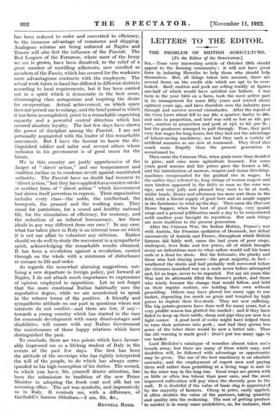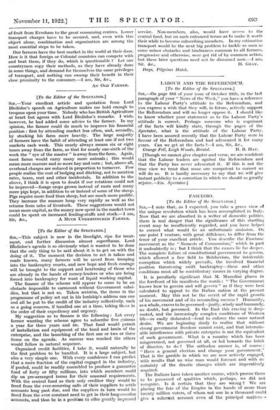LETTERS TO THE EDITOR.
THE PROBLEM OF BRITISH AGRICULTURE. [To the Editor of the SPECTATOR.] SIR,—Your very interesting article of October 28th should appeal to the farming community ; it will not have great force in inducing Hercules to help those who should help themselves. But, all things taken into account, there are several items on the credit side which are apt to be over- looked. Beef, mutton and pork are selling readily at figures one-half of which would have satisfied our fathers. I was born in the year 1884 on a farm, took the most active part in its management for some fifty years and retired about eighteen years ago, and have therefore seen the industry pass through and survive several vicissitudes. After the repeal of the Corn Laws wheat fell to say 40s. a quarter, barley to 20s. and oats in proportion, and beef was sold as low as 42s. per cwt., mutton in proportion and pork at 41d. to 6d. per lb. ; but the producers managed to pull throxigh. True, they paid very low wages for long hours, but they had not the advantage of labour-saving machinery, nor had they such a variety of artificial manures as are now at command. They lived also much more frugally than the present generation is accustomed to.
Then came the Crimean War, when grain more than doubled in price,' and once more agriculture boomed. For some years good seasons and fair prices gave the farmer a lift, and the introduction of mowers, reapers and steam threshing- machines compensated for the gradual rise in wages. In the earlier days referred to, long strings of women reapers and men binders appeared in the fields as soon as the corn was ripe, and very jolly and pleased they were to be at work, whilst lunch, dinner and afternoon tea were sent them in the field, with a liberal supply of good beer and an ample supper in the farmhouse to wind up the day. Then came the Harvest Home Supper, when the best of good living, very quaint songs and a general jollification made a day to be remembered until another year brought its repetition. But such things are mere tradition to the present generation.
After the Crimean War, the Indian Mutiny, France's war with Austria, the Prussian spoliation of Denmark, her defeat successively of Austria and France, throughout which British farmers did fairly well, came the bad years of poor crops, rinderpest, liver fluke and low prices, all of which brought many an industrious man to what sailors would call his beam ends or a dead lee shore. But the fortunate, the plucky and those who had staying power—the great majority, in fact— weathered the storm and had probably well recovered before the Germans launched war on a scale never before attempted and, let us hope, never to be repeated. For say six years this War and its aftermath filled the farmer's pocket, and those who wisely foresaw the change that would follow, and held on their regular routine, are holding their own without grumbling. Others may have placed too many eggs in one basket, depending too much on grain and tempted by high prices to deplete their live-stock. They are now suffering. The big potato-growers have done well for many years, but a very prolific season has glutted the market ; and if they have failed to keep up their cattle, sheep and pigs they are now in a tight corner. A good herd of swine might have helped them to turn their potatoes into pork ; and had they grown less acres of the tuber there would be now a better sale. Thus the old warning is made good : Don't put too many eggs in one basket.
Lord Bledisloe's catalogue of remedies almost takes one's breath away, but there are many of them which may, and doubtless will, be followed with advantage as opportunity may be given. The use of the best machinery is an absolute necessity, and the employment of expert men and paying them well rather than grumbling at a living wage is sure to be the wiser way in the long run. Good crops are grown with as little or often less labour than poor ones, and the most improved cultivation will pay when the slovenly goes to the wall. It is doubtful if the value of basic slag is appreciated by the majority of farmers. Cheap in price, easily applied, it often doubles the value of the pastures, taking quantity and quality into the reckoning. The cost of getting produce to market is in many cases prohibitive, as, for instance, that of fruit from Evesham to the great consuming centres. Lower transport charges have to be secured, and, even with this object alone, combination and organization arc among the most essential steps to be taken.
Our farmers have the best market in the world at their door. How is it that foreign or Colonial countries can compete with and beat them, if they do, which is questionable ? Let our countrymen copy their methods, as they have already done in some things, and demand for themselves the same privileges of transport, and nothing can swamp their benefit in their close proximity to the consumer.—I am, Sir, &c.,
Ax OLD FARMER.



























































 Previous page
Previous page